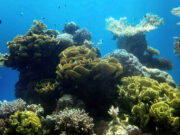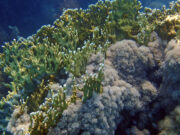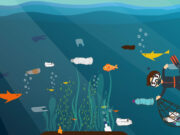climate change
Conserving wildlife across the world could significantly enhance natural carbon capture and storage, a new study has found.
Published in Nature Climate Change and co-authored by 15 scientists from eight countries, the study examined nine wildlife...
Corals in the northern Red Sea could hold the secrets for reef survival in warming seas.
© 2022 KAUST; Morgan Bennett Smith.
Coral reefs underpin the livelihoods of around a...
Liveaboards open up some of the best diving in the world. But at a cost to the environment. Discover how much carbon your liveaboard and flights are emitting and how you could offset it
It’s the front line of climate change and could hold the key to predicting global sea level rise, but what goes on at the underwater face of Greenland’s glaciers is a mystery to science.
A third of all food produced for humans globally is not eaten by anyone. These are shocking facts, right? But we most likely will not act on these facts and will probably even forget them.
Although some have argued that climate change is so overwhelming that conserving coral reefs on a local scale is futile, study finds local actions magnify the effects of climate-driven heat waves. Local action to conserve coral reefs can help reefs withstand the effects of climate change.
In recent weeks the world has been gripped by the ongoing environmental and humanitarian catastrophe unfolding in Australia. The country has been suffering from devastating bushfires since the tail end of last year which is currently ravaging...
The best way to protect corals threatened by climate change is to conserve a wide range of their habitats, according to a study in Nature Climate Change. The finding likely applies to conservation efforts for many other species in...
Image: Dr Maria Byrne, CC by 4.0
Sea urchins can pass heatwave resistance on to the next generation, according to a recently published study.
Global ocean temperatures are increasing,...
Ocean warming is threatening coral reefs globally. Whenever sea temperatures rise in an area, coral reefs degrade. However, a new study has found that corals at or near the equator are less affected than corals elsewhere.
The findings from Florida...





























